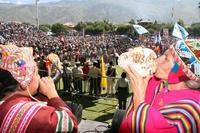 玻利維亞總統莫拉萊斯(Evo Morales)20日在一場氣候變遷與「大地之母的權利」的國際會議開幕儀式演講中,指責資本主義導致了全球暖化並且加速地球生態系統的惡化。
玻利維亞總統莫拉萊斯(Evo Morales)20日在一場氣候變遷與「大地之母的權利」的國際會議開幕儀式演講中,指責資本主義導致了全球暖化並且加速地球生態系統的惡化。
來自129個國家,超過兩萬名原住民、環境與民間代表出席了會議,莫拉萊斯總統在一個位於科恰班巴(Cochabamba)郊區蒂基帕亞村(Tiquipaya)的一個足球場,對與會代表表示歡迎。
「破壞地球的主要元兇是資本主義,生而為人,為了對大地之母表示尊敬,我們都有道德與道義的權利在此表示,大地之母的主要敵人就是資本主義。」莫拉萊斯說,他是波利維亞在西班牙入侵的470年以來,首位真正的原住民領袖。
莫拉萊斯說:「資本主義制度,是在這有限的地球上,促進無限制的生長,以取得最大的利益。」「資本主義是世界不平衡與不對等的源頭。」
玻利維亞總統認為此次會議對12月在哥本哈根失敗的聯合國氣候會議來說是個覺醒。
哥本哈根協議的那些談話,是無力的政治協議,不如玻利維亞和其他許多國家所希望的,能在2012年以前制定具有強力且法律約束力的溫室氣體排放管制並令其生效。
莫拉萊斯20日在這場由聯合國大會去年10月命名的「大地之母的世界英雄(World Hero of Mother Earth)」會議中警告說,如果沒有達成具有強大法律約束力的溫室氣體限制排放協議,將會有可怕的後果。
在第一個溫室氣體管制協議-京都議定書-於2012年底到期之前,必須制定新的協議。今年此輪的國際談判協議已於本月初在德國波昂(Bonn)舉行,下年度的國際氣候會議將於11月29起在墨西哥的坎昆(Cancun)舉行。
「全球的糧食產量將下降40%,使現在全球超過一億以上挨餓的人口繼續增加,」莫拉萊斯警告,「全球20%至30%的動植物可能會消失。」
「全球暖化將導致安第斯山脈和喜馬拉雅山脈的極地冰帽與冰河溶解,某些島嶼將會消失在海面之下,」他警告說。
20日上午召開的會議,包括來自全美原住民的一個多元文化祝福儀式。來自五大洲社會運動的代表們的發言重點,集中在對氣候危機的急迫性以及對保護人權與環境的大膽行動。
代表們在本週的分組會議中,將討論森林、水資源、氣候債務以及財務議題的發展策略,並提出政策建議。
莫拉萊斯總統已承諾將把這些策略和建議帶到坎昆的聯合國氣候會議。
「莫拉萊斯總統已尋求我們對例如『減少毀林及森林退化造成的溫室氣體排放(REDDs)』計畫的建議,」國際印地安人條約理事會的法律顧問薩爾達曼多(Alberto Saldamando)說。
「REDD是一個對森林友好的保育計畫,然而其背後卻是大型污染企業,」薩爾達曼多說。REDD的危險在於,將問題由石化燃料污染的核心問題轉移,並且對全世界靠森林維生的原住民來說,反而意味著災難。
「我們在此聲援那些在南方的弟兄姐妹們,」受莫拉萊斯總統邀請在台上發言的「原民土地環境保護組織(REDOIL)」執行長高米爾(Faith Gemmill)說,「身為人類,我們可以做出選擇:生命的路徑,或是破壞的路徑。在此的人可以改變世界!」
Bolivian President Evo Morales said capitalism is to blame for global warming and the accelerated deterioration of the planetary ecosystem in a speech today opening an international conference on climate change and the "rights of Mother Earth."
More than 20,000 indigenous, environmental and civil society delegates from 129 countries were in attendance as President Morales welcomed them to the conference at a soccer stadium in the village of Tiquipaya on the outskirts of the city of Cochabamba.
"The main cause of the destruction of the planet Earth is capitalism and in the towns where we have lived, where we respected this Mother Earth, we all have the ethics and the moral right to say here that the central enemy of Mother Earth is capitalism," said Morales, who is Bolivia's first fully indigenous head of state in the 470 years since the Spanish invasion.
"The capitalist system looks to obtain the maximum possible gain, promoting unlimited growth on a finite planet," said Morales. "Capitalism is the source of asymmetries and imbalance in the world."
The Bolivian president called this conference in the wake of what he considered to be failed United Nations climate negotiations in Copenhagen in December.
Those talks produced a weak political agreement, the Copenhagen Accord, instead of a strong, legally-binding set of limits on greenhouse gas emissions to take effect at the end of 2012, as Bolivia and many other countries had hoped.
Named "World Hero of Mother Earth" by the United Nations General Assembly last October, today, President Morales warned of dire consequences if a strong legally-binding agreement to limit greenhouse gas emissions is not reached.
A new agreement is needed to govern greenhouse gas emissions after the first commitment period of the Kyoto Protocol expires at the end of 2012. This year's round of international negotiations towards an agreement began earlier this month in Bonn, Germany, and the next annual United Nations climate conference is scheduled for Cancun, Mexico from November 29.
"Global food production will be reduced by approximately 40 percent and that will increase the number of hungry people in the world, which already exceeds a billion people," Morales warned. "Between 20 and 30 percent of all animal and plant species could disappear."
Global warming will cause the melting of the polar ice caps and the glaciers of the Andes and the Himalayas, and several islands will disappear under the ocean," he warned.
The convocation this morning included a multi-cultural blessing ceremony by indigenous peoples from across the Americas. Speeches by representatives of social movements from five continents focused on the urgency of the climate crisis and the need for bold action that protects both human rights and the environment.
The delegates are meeting in working group sessions this week to develop strategies and make policy proposals on issues such as forests, water, climate debt, and finance.
President Morales has pledged to bring these strategies and proposals to the UN climate conference in Cancun.
"President Morales has asked our recommendations on issues such as REDDs [Reducing Emissions from Deforestation and Degradation]," said Alberto Saldamando, legal counsel for the International Indian Treaty Council.
"REDD is branded as a friendly forest conservation program, yet it is backed by big polluters," Saldamando said. "REDD is a dangerous distraction from the root issue of fossil fuel pollution, and could mean disaster for forest-dependent indigenous peoples the world over."
"We are here from the far north to stand in solidarity with our brothers and sisters of the South," said Faith Gemmill, executive director of Resisting Environmental Destruction on Indigenous Lands (REDOIL), who spoke from the stage at the invitation of President Morales. "We have a choice as human kind - a path of life, or a path of destruction. The people who can change the world are here!"





